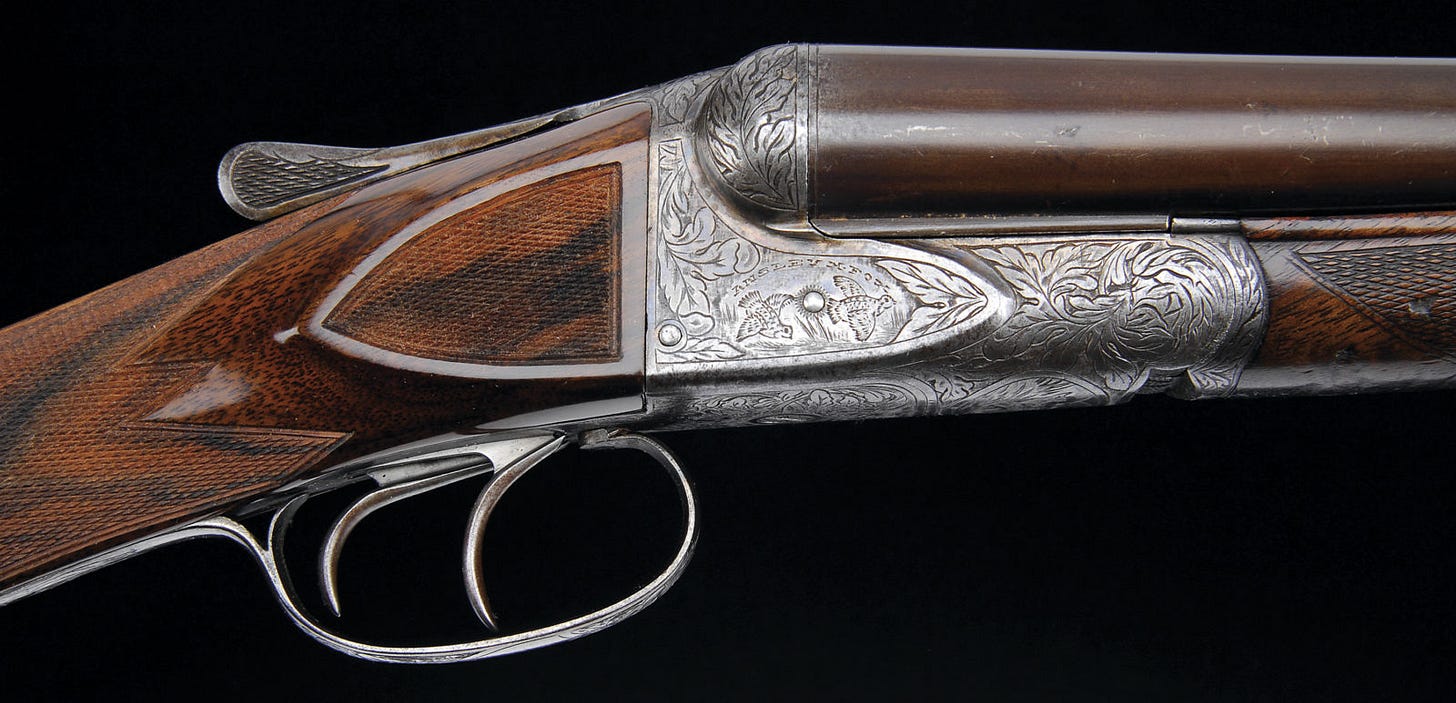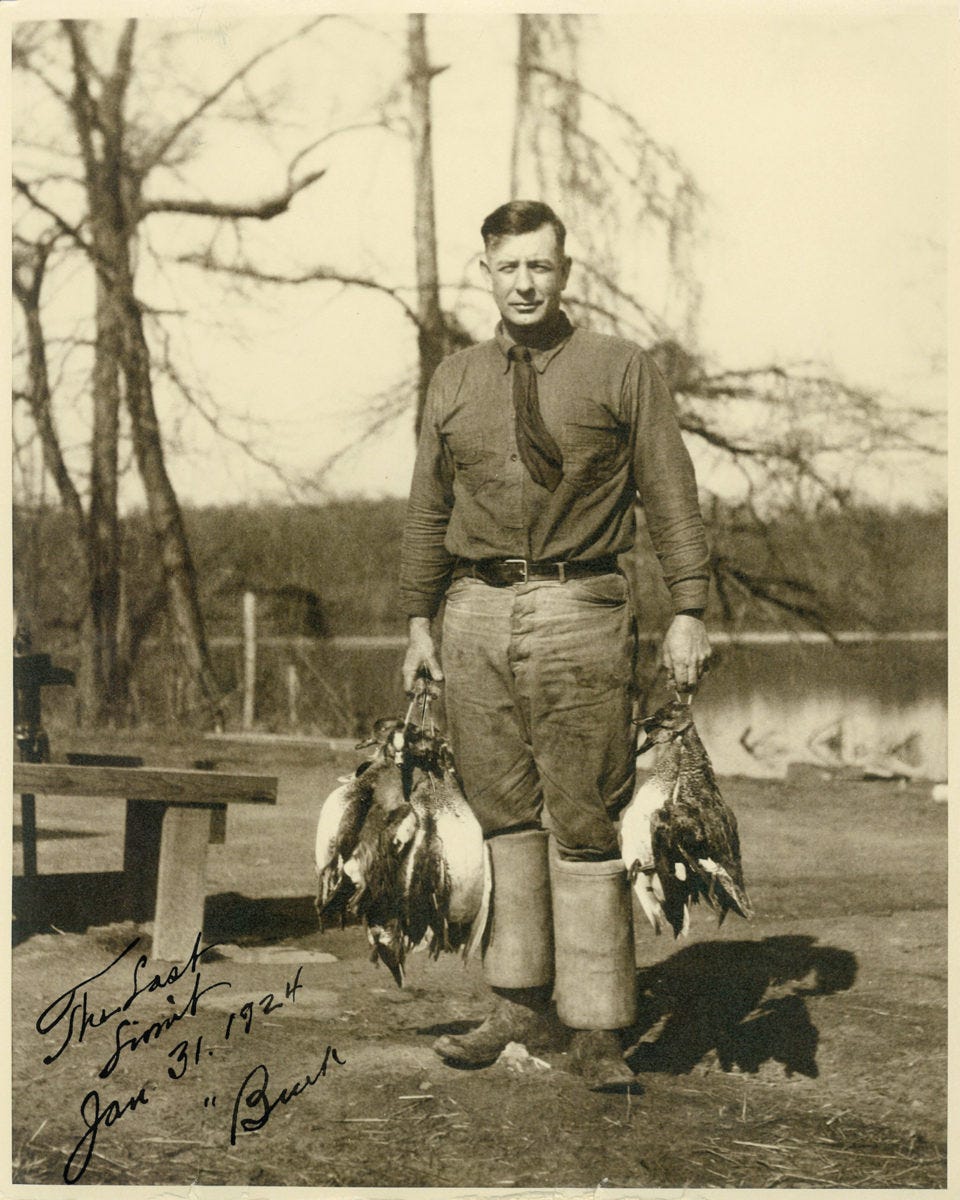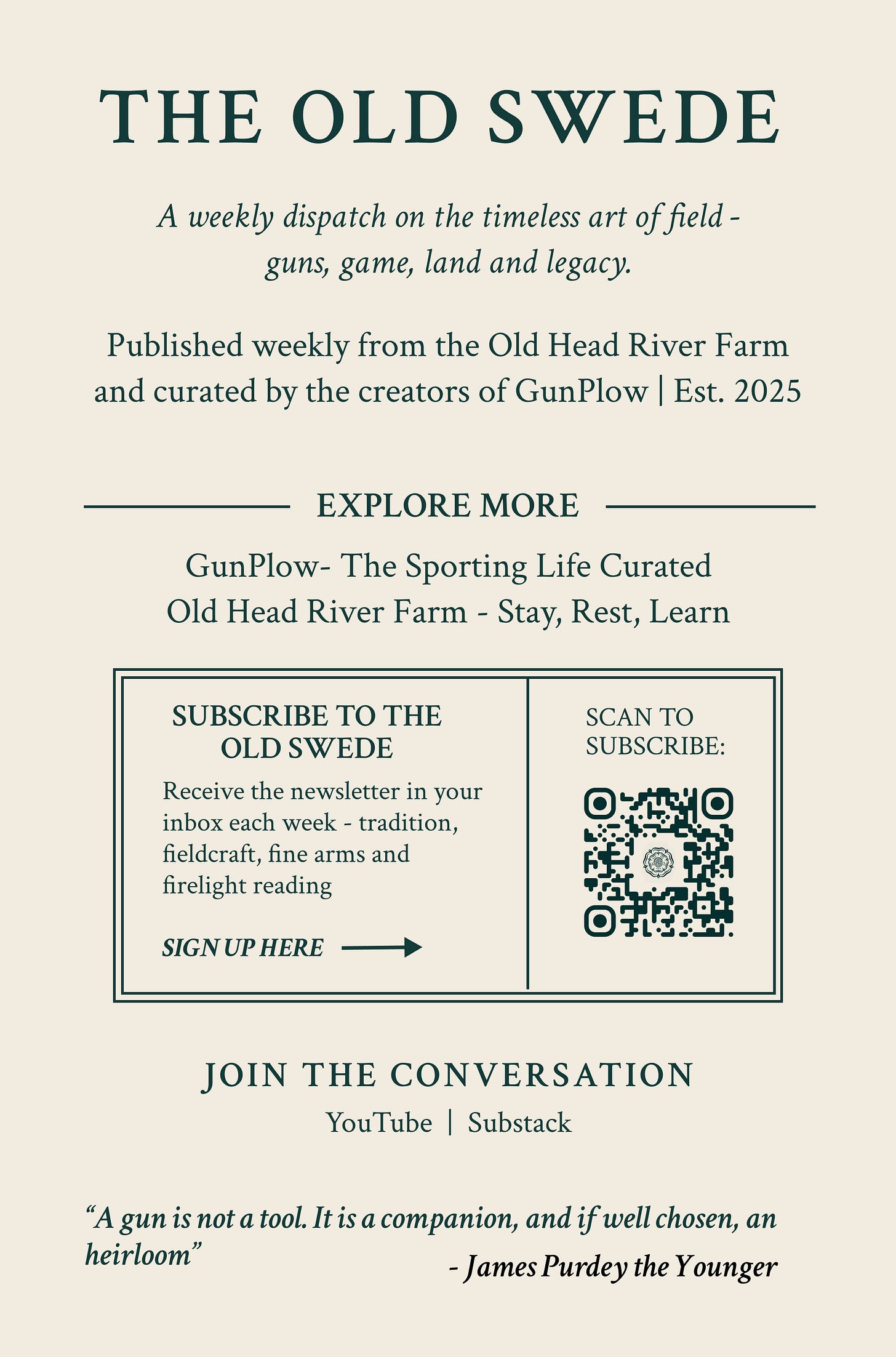The Old Swede: August 13th, 2025
Gentleman in the Field: A Life Measured in Miles Walked, Dogs Led, and Meals Earned
Driven vs. Upland
The Legend of Bo Whoop
Among the legends of American duck shooting, few rise to the mythic stature of Southern author and hunter Nash Buckingham and his famed shotgun, Bo Whoop. A bespoke 12-bore HE Grade Super Fox made by Ansley H. Fox in collaboration with Bert Becker, gunsmith, Bo Whoop became as iconic as the man who shouldered it.
With its tight chokes, long barrels and heavy frame, it was built for Buckingham’s beloved Mississippi Flyway, where he felled mallards with precise authority. It was featured throughout his essays, especially in De Shootinest Gent'man (1934), which captures the bond between man, gun, dog, and wild.
Lost in 1948 when Buckingham left it on his car roof in Georgia, Bo Whoop disappeared for decades. When it finally resurfaced in 2005, restored and auctioned for $201,000, it was more than a shotgun—it was a totem of American sporting life.
"He was de shootinest Gent'man I ever did see," wrote Buckingham—a tribute to both sportsmanship and story.
Recommended Reading
Nash Buckingham, De Shootinest Gent'man (1934); Ducks Unlimited archives; Field & Stream, 2005.
Manners Maketh Man
Etiquette According to Nash
Buckingham’s stories were rich with Southern warmth and pointed reminders of the gentleman’s code afield. His voice—flavored with Delta wit—never strayed far from the heart of etiquette: humility, safety, and reverence.
He taught that conversation should yield to birds on the wing and that the gentleman in the blind should praise another's shot before claiming his own. If your companion missed, you'd better reload without a smirk. Hunting, for Buckingham, was not competitive sport; it was shared art.
Hospitality also mattered. Buckingham described pre-dawn breakfasts of biscuits and molasses, dogs underfoot, and extra gloves passed across thermoses. If someone forgot their shells, you shared. If you dropped a crippled bird, you followed it.
Field decorum was not codified—it was inherited. And it demanded more than just silence and safety; it asked for presence. To listen to the call of the mallard. To thank the cook. To leave a better memory behind than the bag you carried.
Recommended Reading:
De Shootinest Gent'man, "Mr. Buck," Chapter 2.
Kit Review
The Canvas Game Bag
Buckingham’s kit was always practical, rugged, and dignified. Central to his upland and waterfowling days was a well-patinaed canvas game bag, not overloaded, but smartly packed.
A typical morning in the blind saw Buckingham with: a box of Super-X shells from Western Cartridge, a flask tucked behind the outer flap, and spare leather leads for his retrievers. His calls—wooden and brass-rimmed—hung around his neck, worn smooth from years of use.
His writing tells of classic waxed cotton coats, often Filson or L.L. Bean, and boots crusted with river mud or sorghum field dust. Everything had a place: a penknife for dressing ducks, a soft cloth for wiping down Bo Whoop, and a small bible of verse tucked beside his lunch.
His kit was not for show. It was to be used, worn out, and remembered. In the end, his bag didn’t just carry ducks. It carried stories.
Recommended Reading:
De Shootinest Gent'man, "Tall Timber and Tallow Light"
Spirit of the Week
Buckingham’s Pour
Though Nash Buckingham rarely drank in the blind, he had a fondness for bourbon in the evening, when the boots were off, the retriever dry, and the last teal breast sizzling over iron.
Old Forester and early bottlings of Wild Turkey were among the bourbons of the South in his day, but what he valued wasn’t the brand. It was the gesture. A bourbon shared after a hunt was not about proof; it was about poetry.
One imagines Buckingham appreciating today’s Weller Antique 107: a wheated, warm, unapologetic bourbon with notes of cinnamon, cherry, and charred oak. It's not delicate—it’s honest. Much like Nash himself.
Sipped neat by firelight, a glass of Weller pairs well with a slice of wild duck breast and a reading from De Shootinest Gent'man. As he once said, “No joy comes from the kill itself, but from what the day gave us in return."
Recommended Reading:
De Shootinest Gent'man, Chapter "Down in Canaan"; Buffalo Trace Distillery archives.
Pub Spotlight
The Peabody Hotel, Memphis
When Nash Buckingham passed through Memphis, he often found himself seated beneath the chandeliers of The Peabody Hotel, bourbon in hand and dog tales in tow. It was more than a hotel bar. It was a gathering place for Southern gentlemen, hunters, and storytellers.
The Lobby Bar at The Peabody, still in operation today, has poured whiskey for sportsmen for over a century. Here, under pressed ceilings and beside the legendary duck fountain, Buckingham held court with fellow outdoor writers and conservationists.
One could sip a Sazerac, overhear debates about 3-inch magnums, and nod to the bellhop carrying up a brace of mallards. Today, it remains a haunt of sportsmen, especially during duck season on the Mississippi Flyway.
The wood-paneled walls whisper of Bo Whoop, conservation campaigns, and bourbon-scented recollections of the greatest duck days in America.
Recommended Reading:
The Peabody Hotel Historical Society; De Shootinest Gent'man, Letters to the Editor archives.
Upland Adventures
With Gun and Quill
Though best known for his duck shooting, Nash Buckingham cherished his days in the uplands—especially those spent following a fine pointer across broom sedge and sumac.
His tales from the field capture the quiet pride of a single covey rise, the whistle of wings through November air, and the satisfying heft of a double gun swung in rhythm. But more than shooting, Buckingham revered the atmosphere: the scent of powder and pine needles, the lean point of a setter, and the laughter shared under the autumn sun.
His essay "Longleaf and Turnip Greens" is a love letter to quail country. He wrote not of conquest, but of communion—between man, dog, and land.
To hunt quail in Buckingham’s style is to walk slowly, speak little, and shoot last. It is to remember every rise, even when the bag is empty.
Recommended Reading:
De Shootinest Gent'man, "Longleaf and Turnip Greens"







